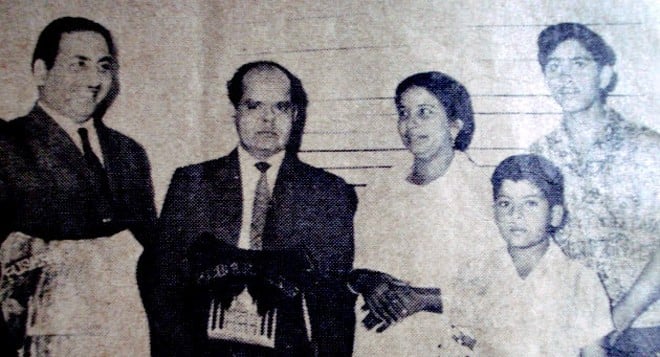
There’s reason why Roshan Lal Nagrath was labelled the composer’s composer

Roshan Lal Nagrath’s death anniversary must have been observed last week. The Gujranwala born music composer par excellence died in mid-November 1967. He went to Marris College of Music in Lucknow, played the esraj and chose to become a music director.
He was Khurshid Anwar’s assistant in the late 1930s, while he worked at the All India Radio, and helped him in composing music for film Singhar. The other assistant of Khurshid Anwar who also made a name for himself in the same field was O.P. Nayyar.
Roshan after a shaky start went on to score successfully for the films in Bombay and reached a level where he was considered a leading composer for the films, competing with the likes of Naushad, Shanker Jaikishan and S.D. Burman.
He was also lucky in the sense that his children too opted for the same field -- his son Rajesh Roshan became a music composer while his second son Rakesh Roshan chose acting as his career. After a chequered career as an actor, Rakesh opted to direct films and in that he is more successful than in his stint as an actor. His son Hrithik Roshan, however, has achieved stardom that eluded the father in his career. Hrithik Roshan became one of the leading stars and still retains that position after more than a decade at the top.
One of the pioneers of film music, Jhande Khan, too, belonged to Gujranwala. He is buried there probably in a grave that cannot be identified. Due to the negligence of the family or the society at large, one of the pioneers of film music in the subcontinent lies buried in an unmarked grave. After partition, he moved to Mohalla Totianwala in Gujranwala and died in 1951. He is said to have been buried at the Bara Kabristan.
Jhande Khan, whose real name was Ghulam Mustafa Khan, had inherited the art of music from his forefathers. After the completion of an intense training in classical music from Ustad Chhajju Khan, Nazir and Khadim Hussain Khan of Bhindi Bazaar, Bombay, he joined theatre before the turn of the 20th century and stayed with it for many years.
Theatre was the most popular means of entertainment, readily available to the masses at that time, since films had not been introduced in the subcontinent as yet.
He, like most of the composers then, was also engaged by gramophone companies, which had become established at about the same time. They employed composers or music directors who had lyrics written and then composed and recorded in voices of promising or established singers. These were then marketed.
This was the first major transition of listening to music -- from being live to being recorded.
Jhande Khan nourished the talent of four of the most outstanding composers of the future as his assistants -- Naushad Ali, Ghulam Mohammed, Shyam Sunder and Hemant Kumar.
Naushad was good on the key instruments and played piano, organ and also harmonium, while Ghulam Mohammed was a good percussionist and played tabla. He put its rhythmic divisions to creative use in his compositions.
Like all pioneers of film composers, Jhande Khan, too, worked initially in the theatre and made a name there. He continued to work for the theatre and his production of Mahabharata was much acclaimed by critics and the general public. But, in the films, he was largely instrumental in crafting the format of the three-minute song with an asthai and two antaraa with fixed interval pieces preceded by a short alaap.
This was to become the prototype for the film song in the subcontinent -- and still has not been improved upon. He became famous for these compositions, Chitralekha, being among them where all the songs were composed on one raag, bhairveen.
For this reason, he is labelled as the composer’s composer.
This great achievement of composing eight different songs in bhairveen and all so distinct was absolutely unthinkable. No other composer of the subcontinent has so far been able to excel this great example set by Ustad Jhande Khan. His name has gained the status of a legend in the realm of music for creating such a great a masterpiece, Chitralekha. It was the culmination of the Ustad’s creative powers.
The point worth noting is that the songs of Chitralekha were written by the now Gujranwala division (Narowal) born Kidar Sharma, a famous lyricist of undivided India and also the producer-director of this venture. In the 1960s, Kidar Sharma remade Chitralekha in colour. Roshan scored the music for this version.
Roshan’s maiden film as a full-fledged composer released in 1948 Bawre Nain starred Geeta Bali and Raj Kapoor. The film was a box-office success and so too was its musical score. It was followed by another musically successful film Hum Log.
But for almost 12 years -- from 1948 to 1960 -- no particular success came Roshan’s way. He remained in the shadows. Only one or two of the songs from each film could gain popularity, for instance, Jia mera beqarar (Madhosh), Sari sari raat teri yaad sataye (Aji Bas Shukriya), Banno ke haath lagi mehndi (Chandini Chowk). But the year 1960 came as a turning point in Roshan’s career, when the resounding success of Madhubala’s Barsat Ki Raat brought the composer enormous fame and popularity.
All its songs especially its qawwali, Ye ishq ishq hai, were instantly on everybody’s lips. In 1964, Roshan also won the Filmfare best music director award on his extremely spellbinding musical score in Bina Rai and Pradeep Kumar starrer Taj Mahal. Roshan’s music for the film Chitralekha in 1964, with Meena Kumari in the lead, had a good score and was rated highly by the connoisseurs.
But, unfortunately, this hard-earned success was soon followed by the tragedy of his pre-mature death in 1967. Barely in his late 40s, Roshan died of heart failure.